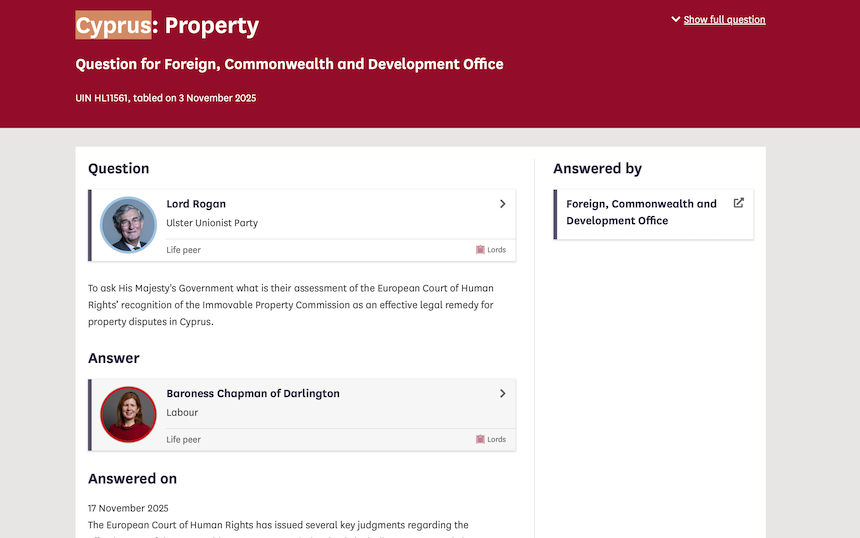The United Kingdom has delivered one of its clearest acknowledgements to date regarding the Immovable Property Commission (IPC), following a written parliamentary question tabled in the House of Lords. Interest in the IPC continues to grow in Westminster, particularly as the property issue remains one of the most politically sensitive aspects of the Cyprus dispute.
The question came from Lord Rogan - Deputy Speaker of the House of Lords since 2018 and Leader of the Ulster Unionist Party in the Lords since 2009. He asked:
“To ask His Majesty's Government what is their assessment of the European Court of Human Rights’ recognition of the Immovable Property Commission as an effective legal remedy for property disputes in Cyprus.”
Baroness Chapman, speaking on behalf of His Majesty’s Government, stated:
“The European Court of Human Rights has issued several key judgments regarding the effectiveness of the Immovable Property Commission (IPC), including most recently in June 2025 where it judged the IPC to remain a valid legal remedy to domestic property disputes in Cyprus, although also noted procedural delays. The Government monitors closely the continued effectiveness of the IPC, including through the Committee of Ministers for Human Rights at the Council of Europe.”
This response is highly significant. Just as the European Court of Human Rights (ECHR) has consistently confirmed the IPC as the correct and effective domestic remedy for property disputes in Cyprus - most notably through the landmark Demopoulos ruling and again in its June 2025 judgment - the United Kingdom has now publicly aligned itself with that position.
Crucially, this comes at a time when the Greek Cypriot administration continues to insist that property remains an “unresolved” problem on the island, despite the fact that a fully functioning and internationally validated solution - the IPC - has existed for nearly twenty years. Instead of directing its citizens to this lawful and effective mechanism, the Greek Cypriot leadership continues to dissuade Greek Cypriots from applying, keeping the issue politically convenient while withholding access to the very remedy recognised by the ECHR and now reaffirmed by the UK.

By stating that the Government “monitors closely the continued effectiveness of the IPC,” the UK makes clear that it recognises both the Commission’s ongoing legitimacy and its central role in resolving property disputes. This directly undermines claims that no remedy exists and strengthens the TRNC’s position within international discussions on the property issue.
The response also demonstrates that the IPC - despite political pressure and persistent attempts to ignore its existence - remains firmly rooted in international law and continues to be treated as such by key European actors.
For Northern Cyprus, this marks an important reaffirmation: the IPC is effective, lawful, and recognised - not only by the European Court of Human Rights, but now also explicitly by the United Kingdom.
Source:
https://questions-statements.parliament.uk/written-questions/detail/2025-11-03/HL11561#answer#:~:text=Cyprus













